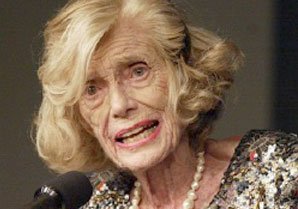Eunice Kennedy Shriver, a champion of the mentally retarded, the
wife of a one-time vice presidential candidate and the sister of a
president, died early Tuesday surrounded by relatives at a Hyannis
hospital. She was 88.
By Alec Macgillis
The Baltimore Sun
Eunice Kennedy Shriver, a champion of the mentally retarded, the wife of a one-time vice presidential candidate and the sister of a president, died early Tuesday surrounded by relatives at a Hyannis hospital. She was 88.
Shriver had suffered a series of strokes in recent years and died at Cape Cod Hospital, her family said in a statement. Her husband, her five children and all 19 of her grandchildren were by her side, the statement said.
A Potomac resident for more than 40 years, Mrs. Shriver was an activist in the field of mental retardation and founded the Special Olympics for mentally disabled athletes. She was the wife of Peace Corps founding director and one-time vice presidential candidate R. Sargent Shriver and a sister of the late President John F. Kennedy.
Mrs. Shriver’s son, Mark K. Shriver, is a former Maryland state delegate from Montgomery County. Her daughter Maria Shriver is a former NBC correspondent who is married to California Gov. Arnold Schwarzenegger.
With Eunice Shriver’s death, Jean Kennedy Smith becomes the last surviving Kennedy daughter.
“She was the light of our lives, a mother, wife, grandmother, sister and aunt who taught us by example and with passion what it means to live a faith-driven life of love and service to others,” the family said.
The hospital is near the Kennedy family compound, where her sole surviving brother, Sen. Edward Kennedy, has been battling a brain tumor.
Sen. Kennedy said his earliest memory of his sister was as a young girl “with great humor, sharp wit, and a boundless passion to make a difference.”
“She understood deeply the lesson our mother and father taught us — much is expected of those to whom much has been given,” he said in a statement. “Throughout her extraordinary life, she touched the lives of millions, and for Eunice that was never enough.”
President Barack Obama said Mrs. Shriver will be remembered as “as a champion for people with intellectual disabilities, and as an extraordinary woman who, as much as anyone, taught our nation — and our world — that no physical or mental barrier can restrain the power of the human spirit.”
Mrs. Shriver had been grappling with a series of illnesses in recent years. In November 2007 she was hospitalized in California after suffering a minor stroke. She had also been treated for a stress fracture of the left hip. Five years earlier, Mrs. Shriver was hospitalized at Johns Hopkins Hospital after surgery to remove a benign pancreatic tumor, then suffered a post-operative infection.
As celebrity, social worker and activist, Mrs. Shriver was credited with transforming America’s view of the mentally disabled from institutionalized patients to friends, neighbors and athletes. Her efforts were inspired in part by the struggles of her mentally disabled sister, Rosemary.
More broadly, she was recalled as someone whose tireless commitment to society’s neglected stood out even in a family known for its social activism.
“She was one of the greatest women of the 20th century and the moral center of the family,” said Laurence Leamer, author of The Kennedy Women. “Of all the [Kennedys], I don’t know if there was someone who did such good in the world. If anyone in the family is an inspiring story, it’s her.”
While best known for her work with the Special Olympics, Mrs. Shriver was equally invested in the 50-year-old Joseph P. Kennedy Jr. Foundation and newer initiatives such as Community of Caring, founded by Mrs. Shriver in 1981 to reduce teenage pregnancies and the incidence of mental retardation.
Mrs. Shriver’s colleagues at the organizations recalled her tireless attachment to the causes. She amazed friends by taking part in a Cape Cod bike race to raise money for Best Buddies, a program founded by her son Anthony which matches up the mentally retarded with college student volunteers.
“[Her commitment] was unwavering, amazing and very real,” said Michael Hardman, a former Special Olympics board member from Utah. “One of the things she was able to do is keep her focus, which was making significant changes in the lives of people with mental retardation and their families.”
Mrs. Shriver’s association with the cause began in her childhood, when she, even more than her other siblings, took particular interest in the care of Rosemary. “It always seemed that Eunice reached out to make sure that Rosemary was included in all the activities — whether it was Dodge Ball or Duck Duck Goose,” Sen. Edward Kennedy recalled 1987.
Mrs. Shriver always maintained, though, that her interest in the issue was founded on more than just personal history; the plight of the mentally retarded, for years segregated from the social mainstream and avoided in open conversation, appealed to her most basic instincts, she said.
“I think that really the only way you change people’s attitudes or behavior is to work with them. Not write papers or serve on committees,” she said in a 1966 interview. “Who’s going to work with the child to change him, with the juvenile delinquent and the retarded? Who’s going to teach him to swim? To catch a ball? You have to work with the person. It’s quite simple, really.”
Mrs. Shriver’s work started behind the scenes. In the 1950s, she persuaded her father to direct his foundation’s funds to help the mentally retarded, rather than to more traditional Catholic charities. After her brother became president in 1961, Mrs. Shriver coaxed him to take action, too; within months, he created the President’s Committee on Mental Retardation, which in turn led to the establishment, in 1962, of the National Institute for Child Health and Human Development, and to the passage of numerous bills combating mental retardation.
In the meantime, Mrs. Shriver began complementing her policy push with hands-on activism. In 1962, she and her husband set up a day camp for retarded children at Timberlawn, a 20-acre Rockville farm they had rented, because, in her words, she felt some “indignation because they didn’t have a place to go. I started it because I couldn’t understand — it was a very simple emotion — why, why, in heaven’s name, they weren’t in camps.”
While the camp started with only a few dozen children, hers was no mere token gesture: many of the campers were severely retarded, from Washington D.C.’s poorest neighborhoods. “She was playing with them on the ground, getting dirty with them. That’s what she loved,” Mr. Leamer said.
Five years later, the Special Olympics were born at Soldier Field in Chicago. One thousand athletes from 26 states and Canada took part; swimming contestants splashed in a 3-foot high pool, so unsure were organizers about the contestants’ capabilities. Today, the games annually involve more than 1.2 million children in 160 countries — and the swimming events take place in Olympic-size pools.
On the job, Mrs. Shriver established a reputation as a demanding, energetic and forward-looking leader who shared her brother Jack’s rapid-fire, Boston-accented locutions, as well as his impatience for “people who pontificated endlessly,” as Mr. Leamer put it.
This occasional terseness extended to the social sphere: Mrs. Shriver’s friends joke about her habit of abruptly leaving, or shutting down, her own dinner parties at 10 p.m. when she felt it was time for her to go to bed.
She met her future husband in 1946, at Jack Kennedy’s Georgetown home. Sargent Shriver was a son of the Maryland aristocracy, Navy veteran and a graduate of Yale Law School. They married in 1953. Mr. Shriver would go on to be the first director of the Peace Corps, to lead Lyndon Johnson’s War on Poverty and to serve as U.S. ambassador to France. In 1972, Democratic presidential nominee George McGovern selected him as running mate.
By all accounts, the couple couldn’t have been better suited for the work they loved. While her more visionary husband fostered the daydreams of expanding the Special Olympics across the globe, his wife attended to the day-to-day operations of the organization, everything from teaching kids how to dribble to arguing event rules with referees.
Mrs. Shriver was a pragmatist to the core: When one of her sons rushed to the Shrivers’ Potomac mansion last year after hearing the building had caught fire, he found his mother outside talking on a cell phone, negotiating a deal for Mary, Mother of Jesus, a movie she was producing for NBC. (A great fan of her son-in-law Arnold Schwarzenegger’s movies, she was known to slip off to the movies by herself on occasion; one of her favorites was E.T., which, she told its director, Steven Spielberg, captured perfectly the experience of the mentally retarded child.)
At the same time, Mrs. Shriver inherited from her mother, Rose, a Catholic faith as deep as it was private — a faith so strong that some predicted, in her youth, that she would become a nun. It was this faith, Mr. Leamer said, that helped her withstand the loss of three of her brothers, one to war and two to assassinations, as well as countless other family tragedies.
Mrs. Shriver, who possessed the lanky Kennedy frame, had to contend with her own health troubles as well. Like her brother Jack, she suffered from Addison’s disease, a disorder of the adrenal system, and suffered two broken arms and hip injuries in a head-on collision in 1991.
According to Mr. Hardman, who has also served as a board member and education adviser to the Joseph P. Kennedy Jr. Foundation, Mrs. Shriver’s success at her various organizations lay in her ability to always keep her colleagues focused on the families in need of their services, to keep them from becoming too distracted by studies and other abstract concerns.
“She was concerned that what we did with the foundation’s money would directly benefit people with mental retardation,” Mr. Hardman said. “She is the light of this. She truly is the light that keeps the focus on ensuring that the focus is the most unheralded and neglected people in the world.”
A perfect example, he said, was Mrs. Shriver’s push to train Bosnian teachers in handling mentally retarded students after that country’s war.
Mrs. Shriver’s grounded approach to advocacy for the mentally retarded would be missed, Mr. Hardman said, but there was no question that her own family is well-prepared to carry on the fight. All of her children have been actively involved in the issue in some way or another. Her son Timothy Shriver is the current chairman of the Special Olympics, while her son Anthony Shriver is founder and president of Best Buddies International, which provides services to the mentally retarded.
In 1984, President Reagan awarded Shriver the Presidential Medal of Freedom, the highest civilian award in the United States, and in 1995, she became the first living woman to be depicted on an American coin. Some have argued she should have won the Nobel Peace Prize as well.
Looking back on her leading legacy, the Special Olympics, in interviews later in her life, Mrs. Shriver did not sound particularly surprised by the event’s exponential growth.
“From the very beginning of Special Olympics, we have followed one guiding star — the conviction that most mentally retarded individuals, with proper coaching and training, can exceed the limits that we set for them at any given time or place,” she said in 1983. “Over and over again … we have proved the principle. We proved that retarded athletes could run a 300-yard race. Then a 400-meter race. Then a mile. And now, even the marathon.”
Mrs. Shriver was not without her regrets, though. In 1962, she persuaded her family that it could greatly advance the cause of the mentally retarded by revealing Rosemary’s plight to the nation. In an article in the Saturday Evening Post, Mrs. Shriver described her sister’s situation and explained that “like diabetes, deafness, polio, or any other misfortune, mental retardation can happen in any family” and that “75 to 85 percent of the retarded are capable of becoming useful citizens.”
Unfortunately, she added, this was something her family hadn’t been aware of 20 years before, when her father decided to have Rosemary undergo a prefrontal lobotomy — a botched procedure after which Rosemary was more disabled than she’d been before.
“It fills me with sadness,” Mrs. Shriver wrote, “to think this change might not have been necessary if we knew then what we know today.”
The Associated Press contributed to this story from Hyannis, Mass.














